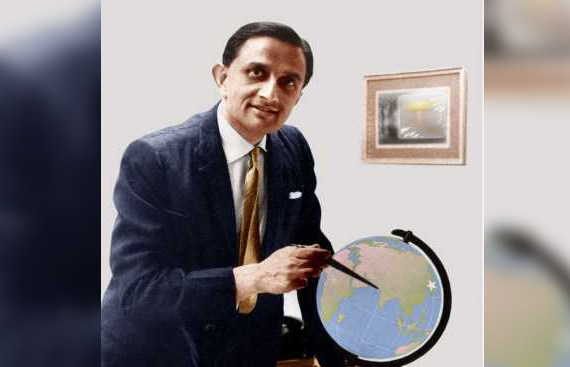Dr. Vikram Sarabhai: Remembering the 'Father of Indian Space Program' on his 102nd Birthday

August 12, a remarkable day in history that marks the 102nd birth anniversary of the famous physicist and astronomer who is popularly renowned as the 'father of Indian space program' Vikram Sarabhai. The brainbox to ignite space research in India and also the one to lead the country towards the development of Nuclear Power. Vikram was born into a most prestigious Sarabhai family - industrialists committed to India's independence movement.
Education & Early days
Having a prestigious background, Vikram attended Gujarat College, Ahmadabad, and continued his studies at the University of Cambridge, England, where he took up natural science. However, the 2nd world war brought him back to India. Landing in India, Vikram carried out research on cosmic rays under the guidance of physicist Sir Chandrasekhara Venkata Raman at the Indian Institute of Science, Bangalore.
Past five years, in 1945, Vikram returned to Cambridge to pursue a doctorate and submitted a thesis on 'Cosmic Ray Investigations in Tropical Latitudes.' However, on his return to India in 1947, he established the Physical Research Laboratory (PRL), also known as the cradle of space sciences in India. P.R.L. had a humble start at his residence and, over time, developed and was set up at the M.G. Science Institute, Ahmadabad. It began with the assistance obtained from the Karmkshetra Educational Foundation and the Ahmedabad Education Society. With the initial focus set on the Cosmic rays and the properties of the upper atmosphere, Prof. Kalpathi Ramakrishna Ramanathan headed the institute as it first director. Nevertheless, the institute had stretched its research towards theoretical physics and radiophysics and later with the Atomic Energy Commission grants.
Turning Businessman...
Although Vikram's keen interest had drawn him towards scientific research, the business and industrial insights he inherited from his family had urged him to indulge in business development actively. Thus, in 1947, Vikram established the Ahmedabad Textile Industry's Research Association and handled the further business development until 1956. Spending his precious time in business development and scientific research, Vikram realized that the country needed to focus on professional management education; he acted and set up the Indian Institute of Management in Ahmedabad in 1962.
Furthermore, India's first market research organization, Operations Research Group (ORG), is another addition to his establishments. Alongside these, his other notable establishments include Nehru Foundation for Development in Ahmedabad, Ahmedabad Textile Industry's Research Association (ATIRA.) and the CEPT, Fast Breeder Test Reactor (FBTR) in Kalpakkam, Variable Energy Cyclotron Project in Calcutta, Electronics Corporation of India (ECIL) in Hyderabad and Uranium, Corporation of India (UCIL) in Jharkhand.
Birth of ISRO!
Being a spree of establishments, Vikram felt the void towards satellites and recognized the need for the country to have its own satellite. Consequently, he persuaded then PM of India, Jawaharlal Nehru, for a space research center, which resulted in the birth of the Indian National Committee for Space Research (INCOSPAR) under the Department of Atomic Energy (DAE) in 1962. Past few years in 1969, INCOSPAR turned as I.S.R.O. In a measure to meet its purpose, ISRO went on to develop India's first satellite 'Aryabhata' the Soviet Union, launched on April 19, 1975, from a Russian cosmodrome. In the next five years, ISRO launched the RS-1 satellite and on boarded its own SLV-3 elevating India to the sixth position in the orbital launches.
Speaking on the need for India's space research center in 1969, Vikram says, "There are some who question the relevance of space activities in a developing nation. To us, there is no ambiguity of purpose. We do not have the fantasy of competing with the economically advanced nations in the exploration of the Moon or the planets or manned space-flight. But we are convinced that if we are to play a meaningful role nationally, and in the community of nations, we must be second to none in the application of advanced technologies to the real problems of man and society, which we find in our country. And we should note that the application of sophisticated technologies and methods of analysis to our problems is not to be confused with embarking on grandiose schemes, whose primary impact is for show rather than for progress measured in hard economic and social terms."
Vikram served as the first chairperson of ISRO and Head of India's DAE On December 30, 1971, he had to inspect the SLV design before leaving to Bombay from Trivandrum the same night. But, unfortunately, he suffered a cardiac arrest the very night and perished at the age of 52. Later his body has been shifted to Ahmedabad for his last rites.
To grace his 102nd birth anniversary, ISRO launched the GISAT-1 Earth observation satellite (EOS). However, the mission turned futile, sighting a stumble due to a performance glitch in the cryogenic phase of the rocket post its launch.
Vikram's Awards & Accolades
The father of the Indian space program was presented with the country's two highest honors - the Padma Bhushan (1966) and the Padma Vibhushan (1972, posthumously). Vikram has held several honorable positions and the list goes as:
- President of the Physics section, Indian Science Congress (1962)
- Founder & Chairman, Space Applications Centre (1963–1971)
- Chairman of the Atomic Energy Commission of India (1966–1971)
- President of the General Conference of the IAEA, Vienna (1970)
- VP, 4th U.N. Conference on 'Peaceful uses of Atomic Energy (1971)
